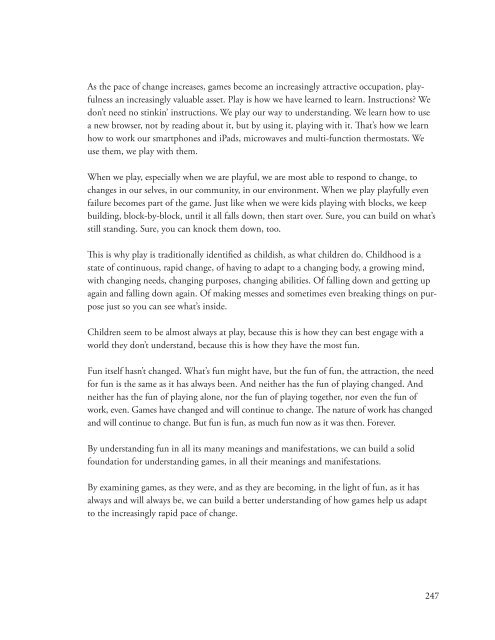A-Playful-Path_DeKoven-web
A-Playful-Path_DeKoven-web
A-Playful-Path_DeKoven-web
You also want an ePaper? Increase the reach of your titles
YUMPU automatically turns print PDFs into web optimized ePapers that Google loves.
As the pace of change increases, games become an increasingly attractive occupation, playfulness<br />
an increasingly valuable asset. Play is how we have learned to learn. Instructions? We<br />
don’t need no stinkin’ instructions. We play our way to understanding. We learn how to use<br />
a new browser, not by reading about it, but by using it, playing with it. That’s how we learn<br />
how to work our smartphones and iPads, microwaves and multi-function thermostats. We<br />
use them, we play with them.<br />
When we play, especially when we are playful, we are most able to respond to change, to<br />
changes in our selves, in our community, in our environment. When we play playfully even<br />
failure becomes part of the game. Just like when we were kids playing with blocks, we keep<br />
building, block-by-block, until it all falls down, then start over. Sure, you can build on what’s<br />
still standing. Sure, you can knock them down, too.<br />
This is why play is traditionally identified as childish, as what children do. Childhood is a<br />
state of continuous, rapid change, of having to adapt to a changing body, a growing mind,<br />
with changing needs, changing purposes, changing abilities. Of falling down and getting up<br />
again and falling down again. Of making messes and sometimes even breaking things on purpose<br />
just so you can see what’s inside.<br />
Children seem to be almost always at play, because this is how they can best engage with a<br />
world they don’t understand, because this is how they have the most fun.<br />
Fun itself hasn’t changed. What’s fun might have, but the fun of fun, the attraction, the need<br />
for fun is the same as it has always been. And neither has the fun of playing changed. And<br />
neither has the fun of playing alone, nor the fun of playing together, nor even the fun of<br />
work, even. Games have changed and will continue to change. The nature of work has changed<br />
and will continue to change. But fun is fun, as much fun now as it was then. Forever.<br />
By understanding fun in all its many meanings and manifestations, we can build a solid<br />
foundation for understanding games, in all their meanings and manifestations.<br />
By examining games, as they were, and as they are becoming, in the light of fun, as it has<br />
always and will always be, we can build a better understanding of how games help us adapt<br />
to the increasingly rapid pace of change.<br />
247


